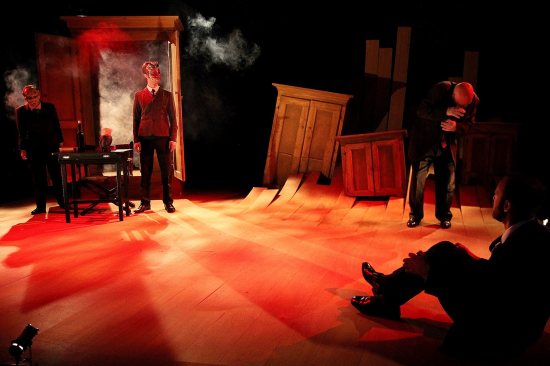Yesterday provided a first experience of sorts: going to the theatre and both enjoying and appreciating the experience. I saw the final production of the Classical Theatre Company’s Doctor Faustus in Houston.
I’ve only been to the theatre a few times in my life, so far. Going to the theatre, ballet, or symphony were just not things we had many opportunities to do in the town where I grew up. Prior to yesterday, I’d been to the theatre twice as a child, once as a high school student while on vacation in Washington, D.C., and once as a college sophomore at the local community college.
This experience was enjoyable because the acting, the environment, and the mise-en-scene were outstanding. This play had four primary actors. Spectators saw these characters, two of whom played more than one character, seamlessly transport us into another world. The theatre and stage were both small – this worked to bring the audience into the story. Some members of the audience were just a few inches from the stage. Performers even interacted with members of the audience at times. The acting and physical environment made the special effects and the music and other stage props that much more powerful. The lighting was particularly enjoyable. I wish I knew all of the technical terms to describe it. (I also wish it were possible to see this performance again!) The magic cabinets surprised each time, too.
I also greatly appreciated the experience. I regularly study the narratives and cultural powers associated with film for both my dissertation and teaching. The theatre is so very different than film. As I was watching Doctor Faustus yesterday, I kept Susan Sontag’s idea about the theatre being much more free and democratic than the movies were the director is dictator, controlling exactly what is and is not seen and heard every-single-second all-the-time.
In the theatre, my eyes really were allowed to wander around on stage. I was able to watch and study different characters and objects on the stage as I pleased.
I also realized more fully than before that theatre takes special talent – films rehearse scenes that are a few minutes for hours. In the theatre, once the show is on, there’s no stopping. Performers have to both be more rehearsed and more dedicated to making art AND they have to be trusted more – allowed to improvise as and if needed without a director’s immediate influence.
Theatre also involves more art since the story is more confined to the immediate stage – physically speaking.
As my research involves historical memory and cultural representations, I was also considering how theatre generally and this performance of Doctor Faustus specifically could be studied in these frameworks. My main realization at this point is that theatre, of course, is connected to larger cultural discourses and historical backdrops but neither constitutes, nor forms what we might call an “institutionalized historical memory” in the way Hollywood productions do.
I look forward to attending more plays and learning much more about the theatre!

Image from: http://classicaltheatre.org